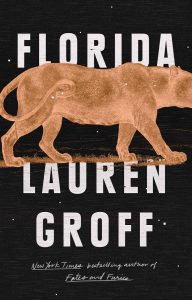Lauren Groff took the literary world by storm with her 2015 novel “Fates and Furies.” The novel was shortlisted for the National Book Award, and Barack Obama named it his favorite book of 2015. Groff is back again this summer with the release of her latest work – a similarly potent collection of short stories titled after Groff’s home state of Florida.
“Florida” reminds readers of its name in every story ‒ most stories take place in the state, or at least feature characters with ties to it. However, Florida presents more of a tonal atmosphere than a literal setting in this collection.

“Florida” by Lauren Groff. Courtesy laurengroff.com
All of the classic markers of the Floridian environment are there, but they are dramatized in a way that divorce them from reality. Because of this, the collection teeters stylistically at the edge of magical realism, but it eschews this classification in favor of something closer to surrealism. Descriptors such as “mold and humidity and devilish reek of snakes,” as well as more urgent references to environmental hazards, feel more like projections of the characters’ psyches than aspects of the objective world.
The story “Flower Hunters” is a prime example of this. A sinkhole opens in the protagonist’s yard, and throughout the story, she “prods and prods the sinkhole in her mind.” Her obsessive dwelling on the sinkhole, which is small and does not worry the protagonist’s husband, is itself indicative of her anxiety. This connection, however, runs even deeper. The protagonist is saddened and worried by her recent loss of a best friend who grew tired of her. It is at about the same time that her friend “breaks up with her” that the sinkhole opens. Just as she worries that the small sinkhole might be “the shy exploratory first steps of a much larger sinkhole,” she worries that the other important people in her life, especially her husband, will grow tired of her just as her friend did.
“Flower Hunters” contains so many of the prevalent tropes and themes of “Florida” that it might even ‒ albeit slightly reductively ‒ be taken as a microcosm of the collection. It is fraught with the fears and discomforts of parenthood, domesticity and marriage, and it is deeply concerned with environmental issues such as climate change. These concerns are all pertinent to Groff, a long-married mother who expressed in an interview with The Paris Review that humanity may not survive long enough for her to live to 80 years old.
These issues are illuminated throughout the collection, and it is clear that some of the anxiety they produce is linked to Groff’s sense of inevitability. In “The Midnight Zone,” a mother is stalked by the anxieties produced by her feelings of inadequacy in wifehood and motherhood, feelings which come to life in the form of a panther that stalks the woods surrounding the cabin in which she is staying with her children. She knows that she is weak, and fear of the panther reveals to her that she will not always be there for her family. In “At the Round Earth’s Imagined Corners,” the protagonist slowly succumbs to the local university’s offers to buy up his many acres of land, begrudgingly giving over the biotically rich swampland to the concrete and bustle of the university.
Groff is concerned with the fleeting and frail nature of things, and she makes no effort in “Florida” to conceal the fact that she sees much to be anxious about. However, she also populates her world with sunlight that “pours upward as though radiating from the ground,” people who sit behind windows that resemble “domestic aquariums,” and a tree that ‒ because its heavy branches dip and touch the ground before turning upward again ‒ resembles a woman “knuckling her chin and dreaming.” Groff’s “Florida” is a reminder that, in spite of all there is to be worried about, “not everything is decaying faster than we can love it.”






